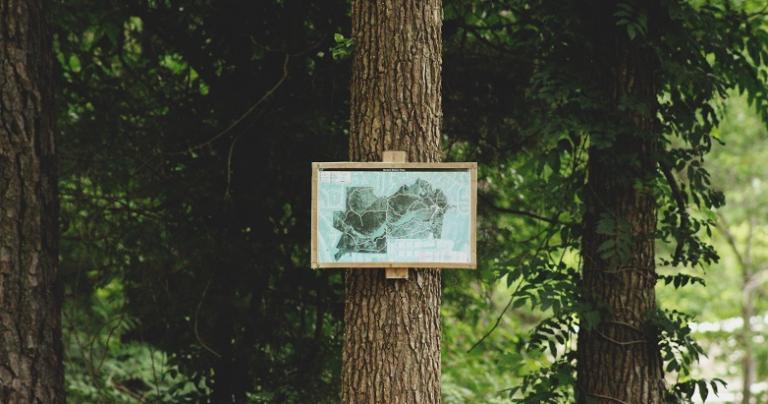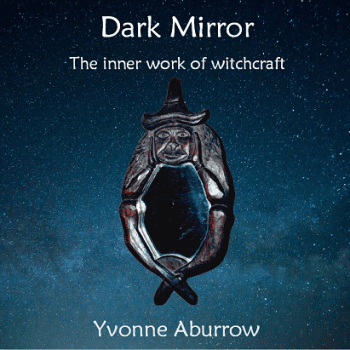Hello, beautiful creatures.
Previously on Outside the Charmed Circle, we talked about entering into relationship with the land we live on, about learning the land and making offerings to it. All good things, to be sure, and I encourage anyone who considers themselves a polytheist, Pagan, or magical practitioner to do so. However, that encouragement is accompanied with some trepidation, because the core practice underneath all of them is something that a great many of us—myself emphatically included—have a hard time with: listening.
Even those of us whose worldview encompasses gods, spirits, angels, demons, and faëries can have a hard time with the idea of listening to the land and its spirits, because much of the expressly Pagan outlook carries with it the lingering aftereffects of the Enlightenment and the Industrial Revolution, in which we think more about the “uses” of things than about our relationships with them. Like so many folks, I started out as a baby witchling burdened with the overly-systematized, even mechanistic worldview one gets from so much of modern Western culture. Then again, when I first set foot on the Crooked Path, I was precisely the sort of eclectic suburban neo-Pagan you’d expect to find in the mid-1980s: equal parts Starhawk, Scott Cunningham, and naïve enthusiasm. I did a lot of magic, but I didn’t think too much about the provenance and underpinnings of what I was doing, or why. Only later, when I started doing research into the why of things, did I start to slough off the unquestioning, quasi-Wiccan creedal beliefs I’d held for years, in favor of something a little less structured and synthetic, a little more messy and organic. I came to realize that the language of elementals, nature spirits, and other indwelling intelligences wasn’t just a metaphor, any more than my own indwelling intelligence was1… or, if it was a metaphor, it was a highly functional metaphor, a solid working hypothesis.
Simply put, as time has gone by, I’ve become more and more of an animist, largely because it reflects my lived experience of relating to the world. Also, it works.
I ended my previous post by stating that spirits are people, by which I mean “beings capable of agency, relationship, and consent.” I’m not going to ask you to “believe” that in any sort of creedal way, any more than I’d ask you to “believe” in this or that deity. Rather, I’ll suggest to you that a bit of practical animism will serve you well in any sort of magic, whether it’s the kind you do with athames and wands or with trowels and harrows. You’ll get much more out of relating to the land as though it were a living being with its own agency than out of treating it like a recalcitrant inanimate asset.
And, as I’ve said multiple times now, that starts with listening. What do I mean by that? Well, let’s break it down to first principles.
Turn On, Tune In, Shut Up
How’s your meditative practice? Not so great? Nonexistent, even? Well, if you’re serious about wanting to listen to to the land, now would be an excellent time to start.
There are a bajillion resources out there for learning how to meditate: classes, books, websites, podcasts, phone apps, and more. Start looking around, read a little, check your local metaphysical shop or meditation center, and try a few things out. Everyone’s mind works differently, so I’m loath to recommend any particular resource, but you’ll figure out what works for your mind soon enough.
What I do want to mention, though, is that there are different types of meditation. There’s meditation to empty your mind of everything, or to focus on one thing to the exclusion of all else. There’s meditation where you’re guided through a predetermined set of images, and meditation where you erase images as they arise in your mind. There’s meditation to relieve stress, to find enlightenment, to see God, and just to clear your head enough to see what’s in front of your face.
What I’m suggesting you do is mostly the latter: reaching out to the land and ask what it needs, then quieting your mind enough that you can just… listen. Hear what it has to say. The following is a simple practice I’ve used for this very purpose.
Opening Negotiations with the Land
Set your space, in whatever fashion you prefer, somewhere quiet and dark where you can sit comfortably. If you live somewhere noisy, it can help to have some sort of music in the background. Nothing with words, or at least, nothing with words you understand and will want to follow along to. Something with just drumming is great, or something synthesizer-y and ambient. Mostly, it’s there to blanket out anything else you have going.
Have something to focus on, such as a candle flame. Sit facing the candle and focus on it for a while.
Now, pay attention to your breathing. Breathe in for four beats, hold for four beats, out for four beats, hold for four beats, and repeat. (Some people skip the hold after breathing out. Do what works for you.) After a while, you can let your eyes relax out of focus, and just continue breathing and maintaining a loose, soft focus on the candle.
At a certain point, reach out to the spirits of the land. You can do this mentally, or verbally. Introduce yourself (or re-introduce yourself), and tell them that you want to live in right relationship with them. Ask them what they need or want, and what you can do for them. You may not get an answer immediately. It might take a time or two. Some land spirits are shy, others are sleeping, others are deeply mistrustful.
Sooner or later, though, you should get a response… and that’s when the fun starts. And by “fun,” what I really mean is “hard work and unpleasantness.”
“Go not to the chaos magicians for counsel…”
To get started why that’s so, let’s turn to my personal favorite writer on chaos magic(k), the delightfully avuncular Ramsey Dukes. Dukes is widely and justly known for his cheerfully English writing style and his no-nonsense attitude about magic. In the pages of his essay collection What I Did In My Holidays: Essays on Black Magick, Satanism and Devil Worship, you will find a short essay containing the single best piece of advice I’ve ever received about magical practice. Fortunately for me, that essay has been posted online—legitimately, even!—so for those who are a little uncertain about popping off and buying a $30 book just on my say-so, allow me to share with you that essay, entitled “A Warning to Those Who Might Consider Becoming White Magicians.”
No, really, you should go read it. I’ll wait. I promise you, it’s an excellent read, despite the title2.
[…time passes…]
Okay, I’ll assume you really did go read it, all eight short paragraphs of it. If you didn’t, that’s fine, but I’m about to quote the last two paragraphs of the essay, almost in their entirety. They work a lot better in context, though, so don’t complain that I spoiled the punchline for you.
Here, then, is the best magical advice I’ve ever received:
…those who decide it is time to listen to Nature must expect an earful of abuse. Those who fulfil their dream of going to a Third World country to tend the needy must expect to be broken on the wheel of politics. Those who decide to foster sensitivity in relationships are invoking hell from their partners. Those who wish to heal ideas will end up in hiding from them. Those who incarnate to save the world will be crucified.
Indeed anyone lead by curiosity and conscience to turn from the clamour of surface reality to listen to the voices of the wind, stars and spirit must not expect reward for their dedication. Instead they must be prepared to cope with the rage of the neglected.
A History of Violence
The rage of the neglected. The cries of the oppressed. The blood of the slaughtered. That’s what you can reasonably expect to hear, should you turn an ear to the land.
Why?
History.
Many of you reading this are, like me, mostly white Americans of European descent. This places us in a historical context. Part of that historical context is that we all live on land which our ancestors, or people related to them, stole from the indigenous peoples of North America. For instance, I was born and grew up on land stolen from the Miwok, Nisenan, and Yokut peoples. Today, my partner and I live south of Seattle, on land stolen from the Duwamish people, and we have a little cabin in the woods which rests on land stolen from the Jamestown S’Klallam tribe.
That sounds pretty shady already, but it leaves out what it actually means to say that my ancestors, and many of yours, “stole land” from the indigenous people. What it means is that the United States, both as a nation-state and as a collection of individual actors, engaged in a systematic pogrom of genocide against the native people of this continent for hundreds of years: killing them, raping them, enslaving them, destroying their lives and their cultures. There were military actions involved, of course, as well as guerilla attacks by self-appointed “Indian fighters” and others, but there were also less obvious forms of warfare employed: ecological, biological, cultural. Wells were poisoned. Game was hunted to extinction. Tribal traditions and customs were outlawed. Diseases were inflicted and encouraged. Bounties were made for every indigenous person killed. And on, and on, and on.
If you’re white and you live in the United States, you are an inheritor and a beneficiary of genocide. This is not an opinion. This is history. These are facts.
Why do I bring this up?
It is, I think, neither romanticizing nor speculation to point out that the indigenous peoples of North America had relationships with the land and its spirits long before the first white person ever set foot in this hemisphere. After all, they’ve lived here for somewhere between ten and twenty thousand years. They had a long, long time to know the land, and to form relationships with its spirits. Those relationships informed their cultures, as surely as such relationships informed the cultures of the Celtic or Nordic peoples so loved by modern neo-Pagans. They had more than ten millennia as the only humans on this continent.
And then, white Europeans came across the water, violated those relationships, murdered and raped the only humans this land had ever known, and claimed the land for its own, a part of their “manifest destiny.”
Again, not opinion, but history.
These were not actions taken by any of you reading this, and indeed, you probably find them abhorrent. The point remains that you and I and every other white American are enmeshed in that historical context. So, as Ramsey Dukes says, if you decide it’s time to listen to what the land has to say, you should expect an earful of abuse.
Entering into Real Relationship
You should expect to hear anger, blame, and trauma. It won’t be pretty. On the contrary, it might be deeply unpleasant. It might be more than you want to take on. If you truly want to live in relationship with the land and its spirits, though, that’s the work.
It may help to start by thinking about developing a relationship with the land as you might with a trauma survivor. Meet the land and its spirits where they are, on their terms. Let them know that you don’t want to take anything from them, but rather that you want to work with them, even for them, for the benefit of all. Ask them how they want to be approached.
Approach the land like you would a person, because it is one.
And, when you get a response, respect it. The land and its spirits may well have some ideas about what they want that you’re not going to care for. You aren’t bound to give it what it wants, of course. The reverse is also true. Sometimes, as I said before, the land says “no,” and other times it asks for things you might not want to give. Relationships are work, and some are more work than you have the time, energy, or desire to devote to them.
That’s a choice you have to make for yourself.
One thing that might also help: if you would learn the land, about its spirit and its soil, you should also make a serious effort to learn about the people who lived on the land before you. Identifying the indigenous people whose land you occupy is a trivial task for anyone with the technology necessary to read this blog post. Read about them. Learn what you can of their history, even (or especially) the parts in which our own ancestors are implicated. If their living descendants have a tribal headquarters, a cultural center, a website, and so on—and many do—visit them. Take their classes, read their literature, learn about their culture as best you can. If you can, support them financially, either through donations or by paying rent, as through programs like Real Rent Duwamish. Learn about them, and learn to see them not as walking ghosts, reminders of our shameful past, but as living people to whom a terrible injustice was done, and is still being done, by white America.
The goal isn’t to become a pretend “native American,” nor is it to absolve yourself of the horrific debt of blood and culture owed to the indigenous peoples. This is neither a dodge nor a panacea for white liberal guilt. The goal is to learn about the real human people who knew this land before any of our ancestors had crossed the water, to make that awareness a part of our living praxis as will-workers: to put some of our own skin in the game, as it were. If you want to be connected to the land, you have to be connected. That means owning your place in its history and entering into real, ethical relationship with both the past and the present.
Which is, as I said before, the kind of enlightened self-interest I want to believe is inherent in Pagan and polytheist praxis.
Until next time, dear ones, be strong. ♥

- Mind you, the reality of my own indwelling intelligence is a debatable point sometimes, especially before coffee, but we’ll pass over that in silence for the moment.
- There are excellent reasons why the terms “white magic” and “black magic” to refer been widely deprecated as racist, classist bullshit, which Tempest covers beautifully in her article on the issue. I’ll only note that (a.) those terms were in much wider vogue at the time this essay was written that than they are now, and (b.) Dukes was speaking to the then-contemporary archetypes of the “white magician,” with neither approval nor condemnation. In fact, his point was pretty much that such distinctions and designations are, as Tempest rightly calls them, bullshit.

















